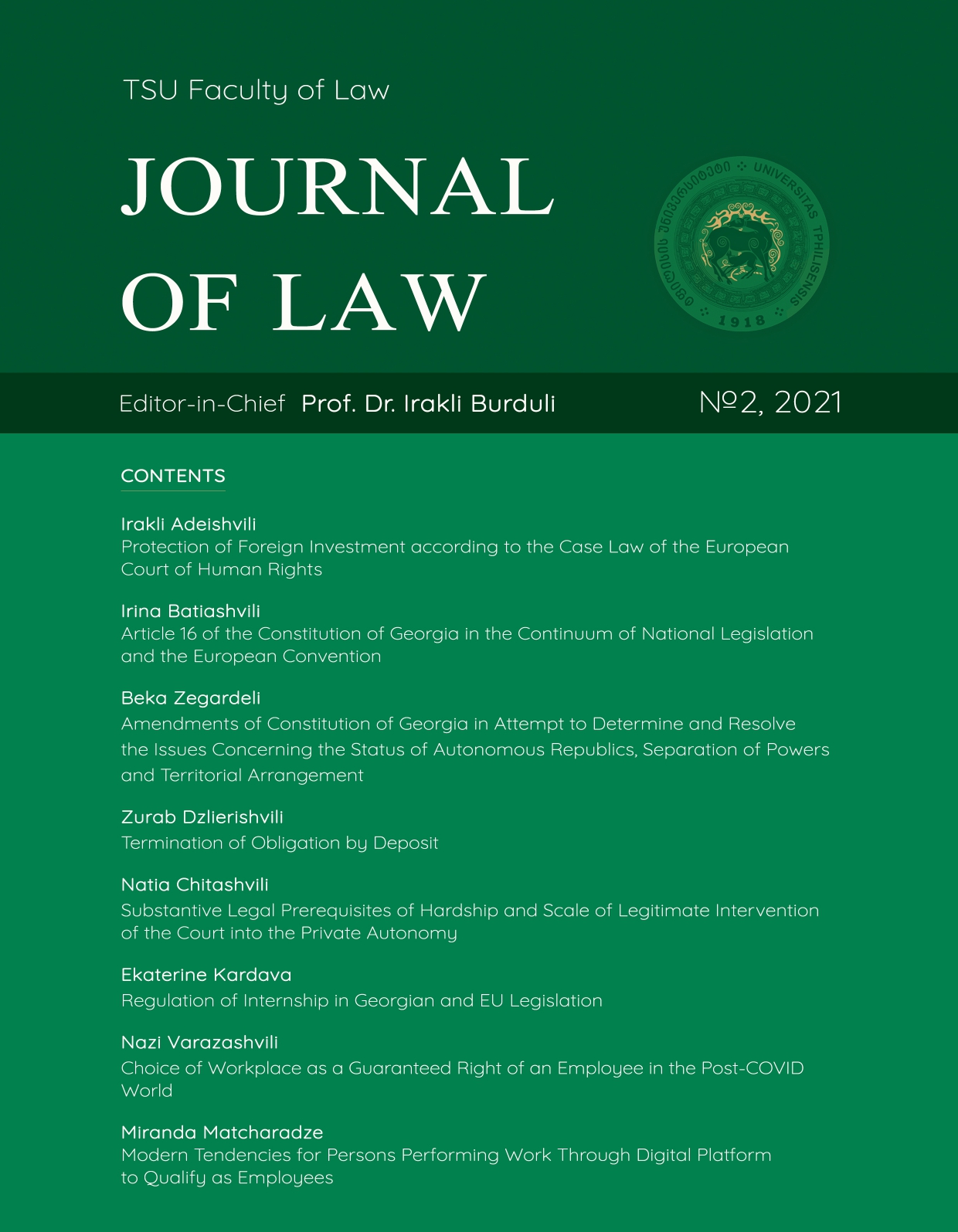Article 16 of the Constitution of Georgia in the Continuum of National Legislation and the European Convention
DOI:
https://doi.org/10.60131/jlaw.2.2021.3617Keywords:
freedoms of belief, religion (confession), and conscience, their limitation purposes, and legitimate forms of intervention.Abstract
According to the Constitution of Georgia, every person has the right to believe in God, to choose and profess any religion, belief or worldview, to share his views, to live and to act in accordance with them. Man, as a unique being, who is the whole spectrum of his own possibilities, is the subject of the philosophy of existence. In this philosophy, conscience is an existential characteristic of human existence and it is a fundamental moral category.
It is essential that the forms of expression of faith and expression of confession be compatible with the fundamental principles of human dignity and inviolability.
States have a certain degree of margin of flexibility during protection of human rights, which is based on the limitations imposed by international law. Existence of such flexibility will not lead to violations of fundamental rights by the state if the state's discretion, restriction of fundamental rights and the "margin of authority" exercised by it are based on the case law of the European Court of Human Rights.
It is interesting to note that the list of legitimate aims of the restriction in the Constitution of Georgia is much narrower than in the European Convention, to which the Georgian state is a party, and according to which cases are heard and decisions are made by the European Court of Human Rights. The European Convention version is an additional shield for protection this important fundamental right, which if the state fails to overcome, its action will be perceived as a violation of the right. In accordance with this paper it is possible to see importance of vital harmony between the balance of justice of competing interests and international practice.
According to Freedom of Thought, Consience and Religion Article 9 of the European Convention on Human Rights, States are entitled to verify whether a movement or association carries on, ostensibly in pursuit of religious aims, activities which are harmful to the population or to public safety. Also, in some cases, the state has the right to take preventive measures to protect the fundamental rights of others.
Therefore, in defining fundamental rights and in exercising the restriction of rights by the state, it is best to adhere unequivocally to the standard of the European Convention.
References
Constitution of Georgia, Departments of the Parliament of Georgia, 31-33, 24/08/1995.
Demetrashvili A., Gogiashvili G., Constitutional Law, Tbilisi, 2016, 97, 102-103 (in Georgian).
Dickson B., The United Nations and Freedom of Religion, International and Comparative law Quarterly, Cambridge University Press, Vol. 44, № 2, 1995, 332.
Heidegger M., Sein und Zeit, Tevzadze G. (trans.), Tbilisi, 2019, 1-917, 413 (in Georgian).
Institute for Development of Freedom of Information, Freedom of Information Guide, 1st ed., Tbilisi, 2012, 7 (in Georgian).
Korkelia K., Izoria L., Kublashvili K., Khubua G., Comments on the Constitution of Georgia, Basic Human Rights and Freedoms, Tbilisi, 2005, 117 (in Georgian).
Kublashvili K., Human Rights, Tbilisi, 2003, 78-79, 137-138 (in Georgian).
Nietzsche F., On the Genealogy of Morality, Writings in two volumes, Vol. 2, Publishing House “Thought”, Moscow, 1990 (in Russian).
Sajó A., Limiting Government: An Introduction to Constitutionalism, Tbilisi, 2003, 2-4, 248 (in Georgian).
Decision of December 14, 2018 № 3/1/752 on the case: “(NNLE) "Green Alternative" v. Parliament of Georgia” of Constitutional Court of Georgia.
Decision of June 26, 2012 № 3/1/512 on the case: “Danish citizen Heike Kronkvist v. Parliament of Georgia” of Constitutional Court of Georgia.
Decision of December 22, 2011 № 1/1/477 of Constitutional Court of Georgia.
Decision of March 11, 2004 № 2/1/241 of Constitutional Court of Georgia.
Gavrilă Baciu v. Romania, [17/9/2013] ECHR (Third Section), Application no. 76146/12.
Handyside v United Kingdom, [07/12/1976] ECHR, Application no. 5493/72.
Leyla Şahin v. Turkey, [10/11/2005] ECHR, Application no. 44774/98, https://hudoc.echr.coe.int/fre#{%22itemid%22:[%22001-70956%22]} [12.01.2021].
Metropolitan Church of Bessarabia and Others v. Moldova, [13/12/2001] ECHR, Application no. 45701/99.
S.A.S. v. France, [01/07/2014] ECHR, Application no. 43835/11.
Dictionary of the English Language, 5th ed., American Heritage, 2011, https://www.thefreedictionary.com/proselytism [27.01.2022].
-Ologies & -Isms, 2008, https://www.thefreedictionary.com/proselytism [27.01.2022].
Downloads
Published
How to Cite
Issue
Section
License
Copyright (c) 2021 Irina Batiashvili

This work is licensed under a Creative Commons Attribution-ShareAlike 4.0 International License.









